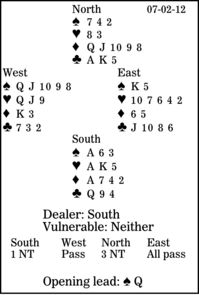Bridge column, July 2: The honor plays are more visible

At the bridge table, every player should be a most offending soul!
Last week, we looked at important spot-card plays. Now we will move to honor-card situations. Even though you watch all of the cards like a hawk, your partner rarely notices when you play a four before a three. However, if you play an honor card, even your partner will see it.
Let us start with defense. How should East and West card to defeat three no-trump by South?
North correctly raised one no-trump to three no-trump. He knew that everyone would admire his diamonds once he tabled the dummy.
West opens with the spade queen. When leading an honor against a no-trump contract, have three touching cards or two touchers and a gap of one. So, with a suit headed by the Q-J-10 or Q-J-9, lead the queen. But with Q-J-8-x or longer, it is usually right to lead your fourth-highest.
Now comes the play inexperienced players find tough. East must overtake with his king to unblock the suit. South will duck, but East returns his second spade. By continuing spades, the suit becomes established and West has an entry in the diamond king.
If East plays the spade five at trick one, South has two winning plays: duck this trick and the next, or win this trick. In both cases, declarer crosses to the dummy in clubs and takes the diamond finesse, cruising home with at least one overtrick.
** ** **
COPYRIGHT: 2012, UNITED FEATURE SYNDICATE
DISTRIBUTED BY UNIVERSAL UCLICK FOR UFS

